theartsdesk in Cheltenham: Seven Concerts in Two Days | reviews, news & interviews
theartsdesk in Cheltenham: Seven Concerts in Two Days
theartsdesk in Cheltenham: Seven Concerts in Two Days
Neoclassical spa town wakes up to skewed chamber music and zestful percussion
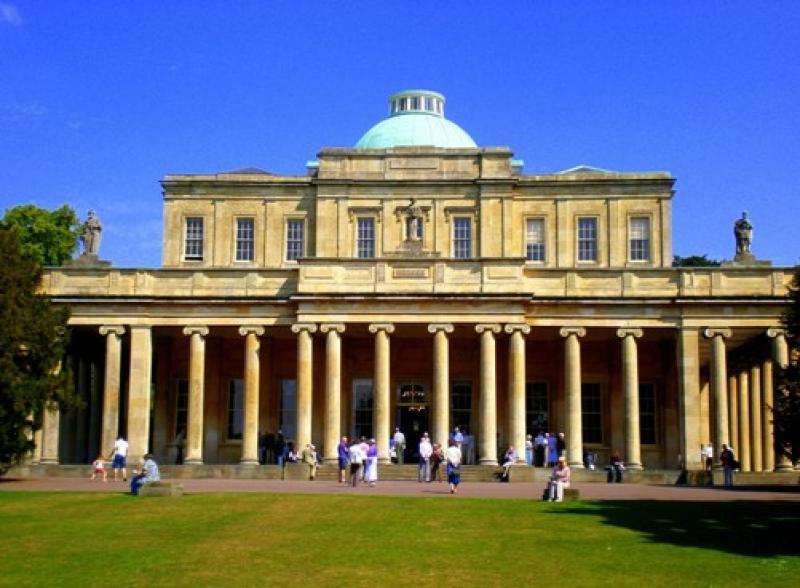
For so many days a year, Cheltenham's Regency symmetry and conservative values totter and buckle as they veer dangerously towards relative festive liberalism. As I sliced into one of the four annual beanfeasts, the Cheltenham Music Festival, it struck me how well lopsided, sometimes painful bendings of a classical framework by Schumann and Brahms sat with a battery of volatile percussion celebrating Steve Reich's 75th birthday.
Anyone familiar with Edinburgh Festival Fringe trawling will know the syndrome: you chance on one fine event, another, and another, and on you go. Except that here we're talking a gaggle of the finest musicians in the world, thanks to the combined forces of enterprising festival director Meurig Bowen's free-range thinking, a Norwegian strain, the vital input of BBC Radio 3's New Generation Artists and some lavish local sponsorship. I'm relieved I could leave exposition of the often subterranean mathematical theme to my colleague on theartsdesk Alexandra Coghlan, but it seems like a good idea.
The venues vary. In the very mixed centre of town there are the heavy 1901 classicism of the Town Hall for bigger concerts - its refreshment rooms and foyer spaces could do with a makeover in every sense, and the hall itself has that inevitable faded-municipal feel - and the brand-new Parabola Arts Centre, offering much needed exhibition spaces and a spanking new 328-seater auditorium. The one drawback is seating for very small people, which doesn't even suit the inmates of Cheltenham Ladies' College whose money paid for it, since the gels tend to be leggier these days. Parabola is a handsome conversion of neoclassical Bayshill House, with the new theatre tucked away behind the facade; but the keynote architecture of the festival locations belongs to the Pump Room at the top of the slope in northernmost Pitville Park, built for the ambitious estate developer in 1825-30 by John Forbes.
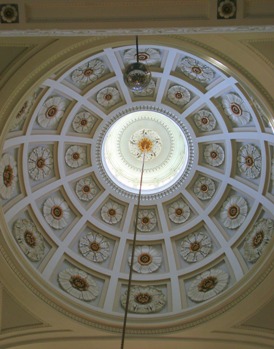 Casson thought it "stilted, high-shouldered and rather graceless", but its position in the landscape is ineffable and its dome encrusted with handsome floral paterae (pictured right) is quite something to crane the neck at.
Casson thought it "stilted, high-shouldered and rather graceless", but its position in the landscape is ineffable and its dome encrusted with handsome floral paterae (pictured right) is quite something to crane the neck at.
Once you get there, that is. Arriving at Cheltenham Spa Station on Saturday at 10.22am without a map, I simply hadn't reckoned on how far it was to the north of the city centre; a half-hour walk along a disused railway track to the southern squares and then a further 20-minute sprint through the wasteland before you reach the elegance of the Pitville Estate meant that we had to flop in the heat for a refreshment stop in the delightful eco-cafe - one of all too few in Cheltenham, as it turned out - on the Lawn and forego the curtainraiser of that morning's 11am concert. Which, owing to a caprice of re-programming turned out to be one of my favourite pianists, Alexander Melnikov, plunging straight into Schubert's Wanderer Fantasy (the very same I'd heard only five days earlier magisterially tackled by a Russian piano giant of the older generation, Elisabeth Leonskaja).
No matter; it will turn up eventually on Radio 3. What we did catch were the Jerusalem Quartet, still at the very top younger generation teams despite the wrong sort of (political) publicity and one change of personnel, etching ghost-scherzos by Brahms - the encore, more memorable perhaps than the slightly more restrained Second String Quartet - and Schumann (the E flat Piano Quartet, with ever-collegial Melnikov keeping his Russian orchestral pianism under wraps except for the few places where it needed to burst forth).
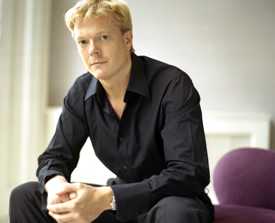 In the even brighter light of Sunday morning - and there's no better place to hear matutinal chamber music, unless it should be Edinburgh's even more lovable Queen's Hall - I count myself lucky to witness the best song recital I've heard over the past couple of decades. This was an event so perfectly calibrated that there was no lazy waking-up: everyone, performers and audience alike, was alert from the first bars to the last. That most adaptable of English tenors Toby Spence (pictured above left by Mitch Jenkins) - who, unlike cabined, confined Bostridge and Padmore really has reached out to a beefier tenor sound while maintaining the lyric beauties needed for more introspective passages - wanted to perform two tough song cycles of obsessive love, Schumann's Dichterliebe and Janáček's Diary of One Who Disappeared, side by side.
In the even brighter light of Sunday morning - and there's no better place to hear matutinal chamber music, unless it should be Edinburgh's even more lovable Queen's Hall - I count myself lucky to witness the best song recital I've heard over the past couple of decades. This was an event so perfectly calibrated that there was no lazy waking-up: everyone, performers and audience alike, was alert from the first bars to the last. That most adaptable of English tenors Toby Spence (pictured above left by Mitch Jenkins) - who, unlike cabined, confined Bostridge and Padmore really has reached out to a beefier tenor sound while maintaining the lyric beauties needed for more introspective passages - wanted to perform two tough song cycles of obsessive love, Schumann's Dichterliebe and Janáček's Diary of One Who Disappeared, side by side.
The festival helped to make it possible, fielding sensuous Australian mezzo Helen Sherman as the temptress who brings out the gypsy in Janáček's ploughboy and three haunting offstage (up-in-the-gallery) voices to complement the most vivid of all song recital pianists. It was really thanks to Julian Milford's razor sharp rapport with Spence that both song-sequences struck as perfect slices of music theatre. And it helped that Spence would stand back out of the light when Milford needed to take urgent centre-stage, which both Schumann and Janáček rigorously demand that the pianist does. A stunning experience in every way which would have been quite enough for one day.
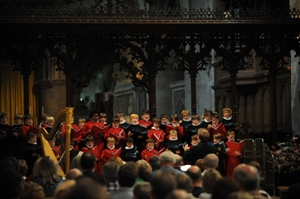 But there were also, of course, the afternoon and evening events. On Saturday afternoon we took the ten-mile trip to Tewkesbury, as remote and other-worldly in essence as Cheltenham is commutable and solid-bourgeois (both are in Gloucestershire, though Tewkesbury has the spacious, end-of-the-country feel of nearby Herefordshire). The festival had fixed a strange and compelling meeting in the massy abbey's Norman nave of trebles from the choir of Gloucester Cathedral and Tewkesbury's own Schola Cantorum (both pictured above right by Becky Matthews, Cheltenham photographer for the next two illustrated events), which features a voice in a thousand - powerful boy soprano Laurence Kilsby. The minute he began to sing, you felt sure that here was BBC Chorister of the Year material, and indeed he had already been a winner in 2009.
But there were also, of course, the afternoon and evening events. On Saturday afternoon we took the ten-mile trip to Tewkesbury, as remote and other-worldly in essence as Cheltenham is commutable and solid-bourgeois (both are in Gloucestershire, though Tewkesbury has the spacious, end-of-the-country feel of nearby Herefordshire). The festival had fixed a strange and compelling meeting in the massy abbey's Norman nave of trebles from the choir of Gloucester Cathedral and Tewkesbury's own Schola Cantorum (both pictured above right by Becky Matthews, Cheltenham photographer for the next two illustrated events), which features a voice in a thousand - powerful boy soprano Laurence Kilsby. The minute he began to sing, you felt sure that here was BBC Chorister of the Year material, and indeed he had already been a winner in 2009.
It was also crystal-clear that genius shines in the very opening bars of Britten's Missa Brevis, which helped to put into perspective for me what a composer really ought to be doing with the trebly clash of innocence and experience (not, for me at any rate, what Muhly is blandly up to in Two Boys at ENO. More on this gulf over on my blog).This and Britten's equally quirky A Ceremony of Carols bookended much sweeter, more syruppy treble stuff by Parry, Gabriel Jackson, Stanford, Ireland and Hadley - the true innovator/outsider versus the establishment - but all of it well done in a context most church and cathedral services don't usually permit, with the special bonus of Catherine White's subtle harp.
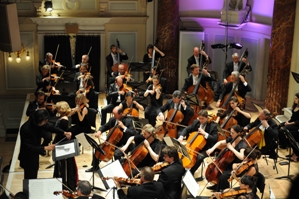 I might have gone on to two more concerts that evening, but for once the first served up definitively enough: Vladimir Jurowski's extraordinarily fresh take on the great concluding Passacaglia of Brahms's Fourth Symphony sharpened the mind and broke the heart so conclusively that my mind wouldn't have been on the music of Graham Fitkin in a late-nighter. The rest of the London Philharmonic's visit to Cheltenham Town Hall (pictured left), where woodwind and brass had to sit steeply raked above strings with timps and percussion looming above them, was more of a mixed bag. There was something emotional about hearing their return to Wagner's Meistersinger Prelude after its initial Festival Hall airing followed by 10 Glyndebourne performances; and Amanda Roocroft, though not in the same league as Christine Brewer had been for Jurowski in Richard Strauss's Four Last Songs, did rise beyond the tension of the tricky first two which clearly taxed and tired her to something better in the final soaring of "Beim Schlafengehen" and a genuinely moving sunset epilogue, which reinforced how the conductor truly has the measure of its depth and sonority.
I might have gone on to two more concerts that evening, but for once the first served up definitively enough: Vladimir Jurowski's extraordinarily fresh take on the great concluding Passacaglia of Brahms's Fourth Symphony sharpened the mind and broke the heart so conclusively that my mind wouldn't have been on the music of Graham Fitkin in a late-nighter. The rest of the London Philharmonic's visit to Cheltenham Town Hall (pictured left), where woodwind and brass had to sit steeply raked above strings with timps and percussion looming above them, was more of a mixed bag. There was something emotional about hearing their return to Wagner's Meistersinger Prelude after its initial Festival Hall airing followed by 10 Glyndebourne performances; and Amanda Roocroft, though not in the same league as Christine Brewer had been for Jurowski in Richard Strauss's Four Last Songs, did rise beyond the tension of the tricky first two which clearly taxed and tired her to something better in the final soaring of "Beim Schlafengehen" and a genuinely moving sunset epilogue, which reinforced how the conductor truly has the measure of its depth and sonority.
 Sunday afternoon was a palate-cleansing Steve Reichfest. Bowen had jumped with three weeks' notice at the chance to slip in a clutch of UK premieres from the phenomenal Kuniko Kato at the Parabola Arts Centre, centred around her composer-approved arrangements of Reich's Electric Counterpoint - steel pans leading the way - Six Marimbas Counterpoint, a duet with Kuniko's pre-recorded self through superlatively good speakers, and Vermont Counterpoint, in which she leapt stylishly between vibraphone and glockenspiel (her recording, which this performance instantly sold to me, pictured above right). I liked the subtle ripple of Kuniko's own sea-picture which launches her own marimba Suite, and the self-styled "aleatoric soul music" of Hywel Davies's hauntingly near-inaudible Purl Ground.
Sunday afternoon was a palate-cleansing Steve Reichfest. Bowen had jumped with three weeks' notice at the chance to slip in a clutch of UK premieres from the phenomenal Kuniko Kato at the Parabola Arts Centre, centred around her composer-approved arrangements of Reich's Electric Counterpoint - steel pans leading the way - Six Marimbas Counterpoint, a duet with Kuniko's pre-recorded self through superlatively good speakers, and Vermont Counterpoint, in which she leapt stylishly between vibraphone and glockenspiel (her recording, which this performance instantly sold to me, pictured above right). I liked the subtle ripple of Kuniko's own sea-picture which launches her own marimba Suite, and the self-styled "aleatoric soul music" of Hywel Davies's hauntingly near-inaudible Purl Ground.
Kuniko is the total artist, no question: her attention to lighting, sound, dancing communication with the audience and questing programme notes reveals a perfectionist. I can't wait to hear her again. And it was a pleasure to hang around the Parabola, which at last gives the lead to the festival to open up a bit to proper art - and by that I don't mean the daubs on the railings in Imperial Gardens. The rooms are small, but handsome enough to display Gillian Lever's brilliant colour-canvases to the right and the quirky, sometimes disturbing print-illustrations of Australia's "National Living Treasure" Michael Leunig.
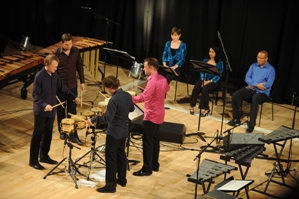 After an hour or so discovering the delights of the terraces around the Parabola and the Cheltenham Ladies' College, as well as the chic haven of Montpellier, the estate to the south which matches Pitville to the north - Cheltenham's midriff, on the other hand, is a bit of a mess - it was time for the ultimate Reich showpiece, the seminal Drumming which triggered something of a percussion revival back in 1971. I knew the sensational Colin Currie and his top notch Group (seven out of twelve, including the women of Synergy Vocals, pictured left) would bring it up fresh as point, and I'd been sorry to miss their Southbank appearance, so this Town Hall special seemed serendipitous. It's the ultimate demonstration of symphonic rhythm, bringing together its bongo, marimba and high-pitched sequences in a grand finale which is a kind of Young Person's Guide to Percussive Possibilities - and I'm glad there were so many kids there, even if the high frequencies seemed to be hurting one youngster's ears.Otherwise listeners of all ages came out wide-eyed and bouncing.
After an hour or so discovering the delights of the terraces around the Parabola and the Cheltenham Ladies' College, as well as the chic haven of Montpellier, the estate to the south which matches Pitville to the north - Cheltenham's midriff, on the other hand, is a bit of a mess - it was time for the ultimate Reich showpiece, the seminal Drumming which triggered something of a percussion revival back in 1971. I knew the sensational Colin Currie and his top notch Group (seven out of twelve, including the women of Synergy Vocals, pictured left) would bring it up fresh as point, and I'd been sorry to miss their Southbank appearance, so this Town Hall special seemed serendipitous. It's the ultimate demonstration of symphonic rhythm, bringing together its bongo, marimba and high-pitched sequences in a grand finale which is a kind of Young Person's Guide to Percussive Possibilities - and I'm glad there were so many kids there, even if the high frequencies seemed to be hurting one youngster's ears.Otherwise listeners of all ages came out wide-eyed and bouncing.
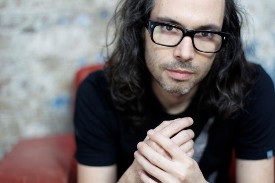 There had to be one low point, and it came in that evening's Pitville Pump Room sellout. Pianist James Rhodes (pictured right by Pavla Kopecna) was touted as a festival star, and column inches were splashed about over his concerto debut in Bach. To ears already spoiled by the best in the business, which of course included Spence's pianist Milford that morning as well as Melnikov, it was a disorienting experience. While Kuniko had been able to get a different dynamic from one of her four sticks, Rhodes's right hand didn't always seem to know what the left was doing. Not quite bad, but not the expected communicative wonder, this Bach, whereas Rhodes's encore, Mozart's Rondo alla Turca Lisztified to the power of ten, seemed both uncalled for by the context and a real horror in its own right. To be fair, Rhodes has been doing his bit for youth education in Cheltenham, and was participating in a special concert for schools the following morning
There had to be one low point, and it came in that evening's Pitville Pump Room sellout. Pianist James Rhodes (pictured right by Pavla Kopecna) was touted as a festival star, and column inches were splashed about over his concerto debut in Bach. To ears already spoiled by the best in the business, which of course included Spence's pianist Milford that morning as well as Melnikov, it was a disorienting experience. While Kuniko had been able to get a different dynamic from one of her four sticks, Rhodes's right hand didn't always seem to know what the left was doing. Not quite bad, but not the expected communicative wonder, this Bach, whereas Rhodes's encore, Mozart's Rondo alla Turca Lisztified to the power of ten, seemed both uncalled for by the context and a real horror in its own right. To be fair, Rhodes has been doing his bit for youth education in Cheltenham, and was participating in a special concert for schools the following morning
But this event wasn't really about Rhodes: it was a concert to celebrate the core values of the ad-hoc Festival Academy, now in its seventh year and mixing UK students with subsidised visitors from Trondheim. Mentored by distinguished tutors and conducted with discipline by Neil Thomson, they had some tricky if not quite first-rate fare to negotiate in the shape of birthday composer Richard Rodney Bennett's Reflections on a 16th Century Tune - the string arrangement of the tune is more interesting than the reflections - and Bliss's meaty but overextended Music for Strings. Real redemption came in the second half with Rhodes taking a back seat for Arvo Pärt's Tabula Rasa: perfect late-night music which sent us out into Pitville Park to smell the lime-blossom and gaze at the stars.
 That should have been the end of my festival stint, if I'd been sensible. I had to be back in London to teach on Monday afternoon; but I worked out that if I had a taxi waiting outside the Pitville Pump Room I could witness the first work of the morning's chamber programme and catch the 11.40am train into the bargain. It meant sacrificing the promise of BBC Young Generation Artists the Escher Quartet, but it did allow me to hear another youthful phenomenon who knocks spots off Rhodes, and indeed most of her contemporaries - the Georgian pianist and Argerich protegee Khatia Buniatishvili (pictured left by E Haase). Her Liszt Sonata had been the unanticipated highlight of Stephen Kovacevich's 70th birthday concert at the Wigmore, and there was no doubt that if she could surmount the insane, concentrated challenges of Prokofiev's Seventh Sonata, she would be worthy of her great mentor.
That should have been the end of my festival stint, if I'd been sensible. I had to be back in London to teach on Monday afternoon; but I worked out that if I had a taxi waiting outside the Pitville Pump Room I could witness the first work of the morning's chamber programme and catch the 11.40am train into the bargain. It meant sacrificing the promise of BBC Young Generation Artists the Escher Quartet, but it did allow me to hear another youthful phenomenon who knocks spots off Rhodes, and indeed most of her contemporaries - the Georgian pianist and Argerich protegee Khatia Buniatishvili (pictured left by E Haase). Her Liszt Sonata had been the unanticipated highlight of Stephen Kovacevich's 70th birthday concert at the Wigmore, and there was no doubt that if she could surmount the insane, concentrated challenges of Prokofiev's Seventh Sonata, she would be worthy of her great mentor.
And she was: none of us will ever hear the colossal grind which leads to the tolling of funeral bells in Prokofiev's great slow movement more timelessly or profoundly articulated. The bluesy toccata-finale was thrilling, of course, leading me to applaud precipitately and incur the baleful glares of a few Cheltenham matrons, but for that alone I'd have reckoned my visit to Cheltenham worthwhile. As it was, I had a wealth of sensory overload to grapple with, and it's taken me a week to digest it properly.
- Details of other Cheltenham Festivals on their collective website
- theartsdesk's comprehensive UK festivals guide
- Further details of BBC Radio 3's New Generation Artists scheme
- Check the Radio 3 website for news of forthcoming Cheltenham Music Festival broadcasts
Share this article
The future of Arts Journalism
You can stop theartsdesk.com closing!
We urgently need financing to survive. Our fundraising drive has thus far raised £49,000 but we need to reach £100,000 or we will be forced to close. Please contribute here: https://gofund.me/c3f6033d
And if you can forward this information to anyone who might assist, we’d be grateful.

Subscribe to theartsdesk.com
Thank you for continuing to read our work on theartsdesk.com. For unlimited access to every article in its entirety, including our archive of more than 15,000 pieces, we're asking for £5 per month or £40 per year. We feel it's a very good deal, and hope you do too.
To take a subscription now simply click here.
And if you're looking for that extra gift for a friend or family member, why not treat them to a theartsdesk.com gift subscription?
more Classical music
 Solomon, OAE, Butt, QEH review - daft Biblical whitewashing with great choruses
Even a top soprano and mezzo can’t make this Handel paean wholly convincing
Solomon, OAE, Butt, QEH review - daft Biblical whitewashing with great choruses
Even a top soprano and mezzo can’t make this Handel paean wholly convincing
 Two-Piano Gala, Kings Place review - shining constellations
London Piano Festival curators and illustrious friends entertain and enlighten
Two-Piano Gala, Kings Place review - shining constellations
London Piano Festival curators and illustrious friends entertain and enlighten
 Echo Vocal Ensemble, Latto, Union Chapel review - eclectic choral programme garlanded with dance
Beautiful singing at the heart of an imaginative and stylistically varied concert
Echo Vocal Ensemble, Latto, Union Chapel review - eclectic choral programme garlanded with dance
Beautiful singing at the heart of an imaginative and stylistically varied concert
 Scott, Irish Baroque Orchestra, Whelan, RIAM, Dublin review - towards a Mozart masterpiece
Characteristic joy and enlightenment from this team, but a valveless horn brings problems
Scott, Irish Baroque Orchestra, Whelan, RIAM, Dublin review - towards a Mozart masterpiece
Characteristic joy and enlightenment from this team, but a valveless horn brings problems
 Classical CDs: Voice flutes, flugelhorns and froth
Baroque sonatas, English orchestral music and an emotionally-charged vocal recital
Classical CDs: Voice flutes, flugelhorns and froth
Baroque sonatas, English orchestral music and an emotionally-charged vocal recital
 Kanneh-Mason, Britten Sinfonia, Shave, Milton Court - a grin and a big beaming smile
A pair of striking contemporary pieces alongside two old favourites
Kanneh-Mason, Britten Sinfonia, Shave, Milton Court - a grin and a big beaming smile
A pair of striking contemporary pieces alongside two old favourites
 theartsdesk at the New Ross Piano Festival - Finghin Collins’ musical rainbow
From revelatory Bach played with astounding maturity by a 22 year old to four-hand jazz
theartsdesk at the New Ross Piano Festival - Finghin Collins’ musical rainbow
From revelatory Bach played with astounding maturity by a 22 year old to four-hand jazz
 First Person: Manchester Camerata's Head of Artistic Planning Clara Marshall Cawley on questioning the status quo
Five days of free events with all sorts of audiences around Manchester starts tomorrow
First Person: Manchester Camerata's Head of Artistic Planning Clara Marshall Cawley on questioning the status quo
Five days of free events with all sorts of audiences around Manchester starts tomorrow
 Goldscheider, Brother Tree Sound, Kings Place review - music of hope from a young composer
Unusual combination of horn, strings and electronics makes for some intriguing listening
Goldscheider, Brother Tree Sound, Kings Place review - music of hope from a young composer
Unusual combination of horn, strings and electronics makes for some intriguing listening
 theartsdesk Q&A: composer Donghoon Shin on his new concerto for pianist Seong-Jin Cho
Classical music makes its debut at London's K-Music Festival
theartsdesk Q&A: composer Donghoon Shin on his new concerto for pianist Seong-Jin Cho
Classical music makes its debut at London's K-Music Festival

Add comment